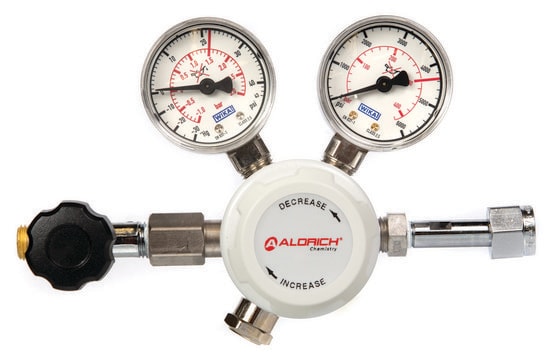294993
Ammonia
anhydrous, ≥99.98%
Synonym(s):
Ammonia gas
About This Item
Recommended Products
grade
anhydrous
Quality Level
vapor density
0.6 (vs air)
vapor pressure
8.75 atm ( 21 °C)
Assay
≥99.98%
form
liquefied gas
autoignition temp.
1203 °F
expl. lim.
25 %
greener alternative product characteristics
Design for Energy Efficiency
Learn more about the Principles of Green Chemistry.
sustainability
Greener Alternative Product
pH
~10-12 (20 °C, 50 g/L)
pKa (25 °C)
9.25
bp
−33 °C (lit.)
mp
−78 °C (lit.)
solubility
water: 531 g/L at 20 °C
density
0.7 g/cm3 at -33 °C
greener alternative category
SMILES string
N
InChI
1S/H3N/h1H3
InChI key
QGZKDVFQNNGYKY-UHFFFAOYSA-N
Looking for similar products? Visit Product Comparison Guide
Related Categories
General description
Application
Packaging
Compatible with the following:
- Aldrich® lecture-bottle station systems
- Aldrich® lecture-bottle gas regulators
Other Notes
Legal Information
also commonly purchased with this product
control valve
hose barb
purge valve
recommended
Signal Word
Danger
Hazard Statements
Precautionary Statements
Hazard Classifications
Acute Tox. 3 Inhalation - Aquatic Acute 1 - Aquatic Chronic 2 - Eye Dam. 1 - Flam. Gas 2 - Press. Gas Liquefied gas - Skin Corr. 1B
Supplementary Hazards
Storage Class Code
2A - Gases
WGK
WGK 2
Flash Point(F)
Not applicable
Flash Point(C)
Not applicable
Personal Protective Equipment
Certificates of Analysis (COA)
Search for Certificates of Analysis (COA) by entering the products Lot/Batch Number. Lot and Batch Numbers can be found on a product’s label following the words ‘Lot’ or ‘Batch’.
Already Own This Product?
Find documentation for the products that you have recently purchased in the Document Library.
Customers Also Viewed
Articles
Atomic layer deposition meets various needs including semiconductor device miniaturization and nanoparticle coating.
Acid and base chart lists the strength of acids and bases (strongest to weakest) in order. Simple to use laboratory reference chart for scientists, researchers and lab technicians.
Our team of scientists has experience in all areas of research including Life Science, Material Science, Chemical Synthesis, Chromatography, Analytical and many others.
Contact Technical Service











